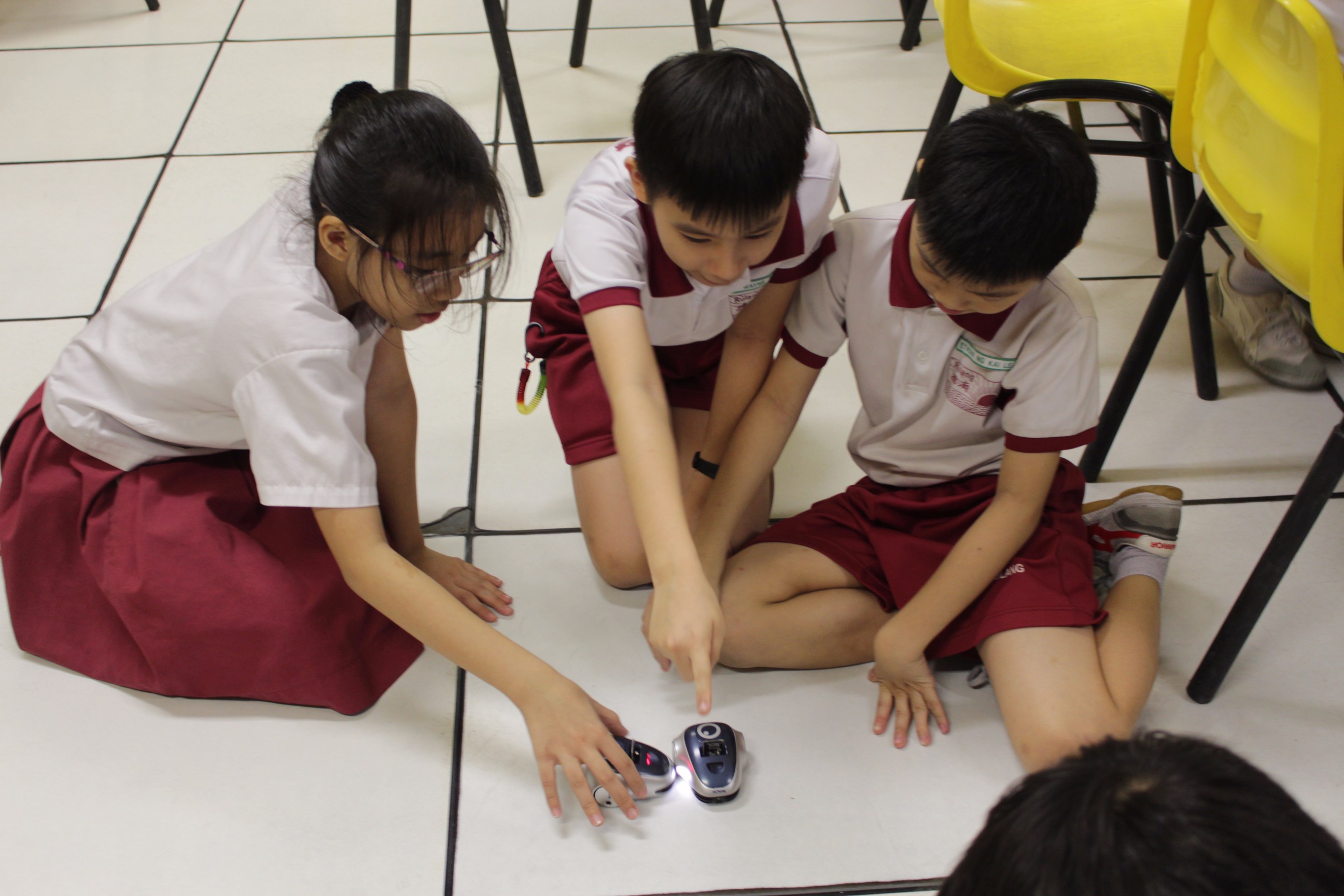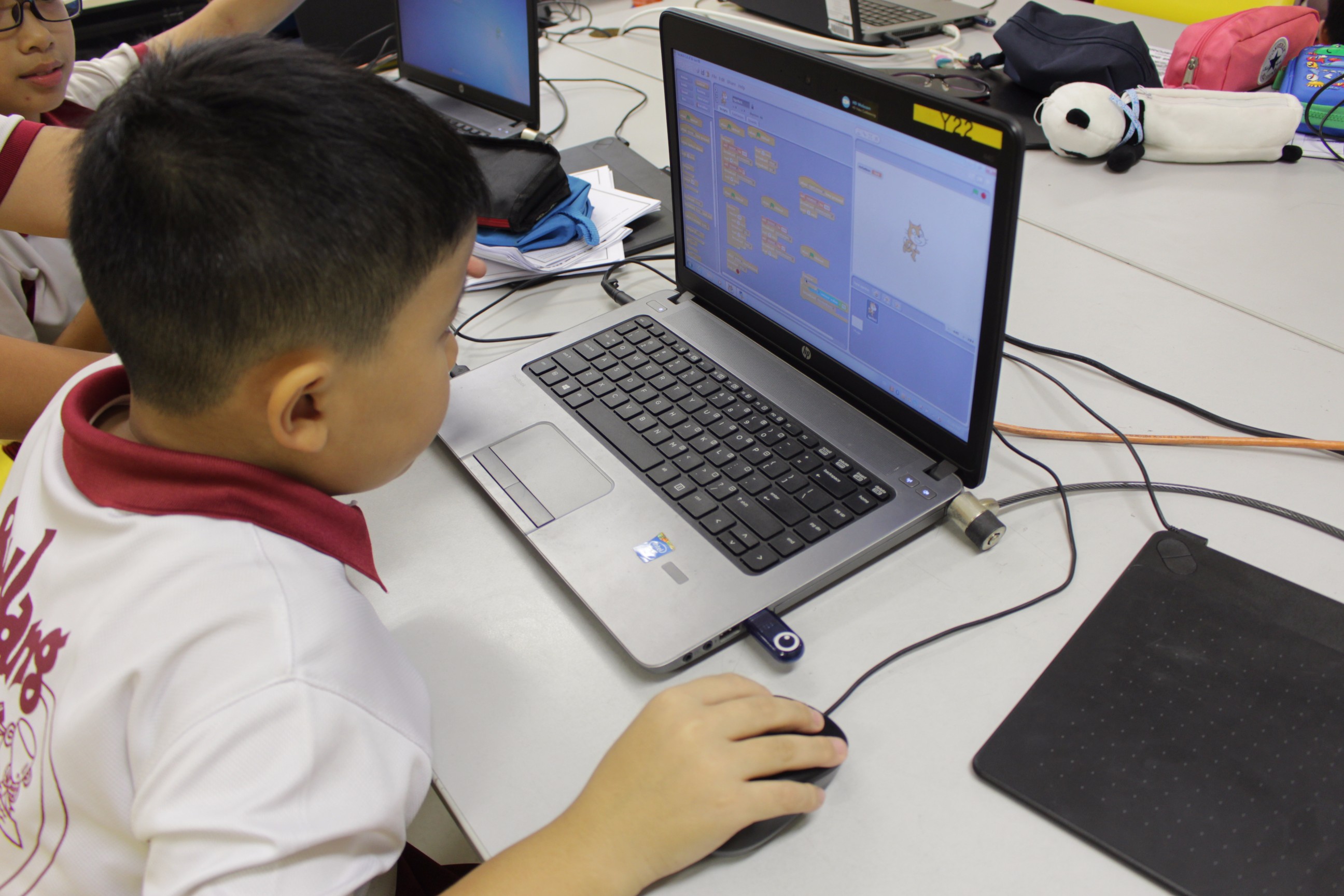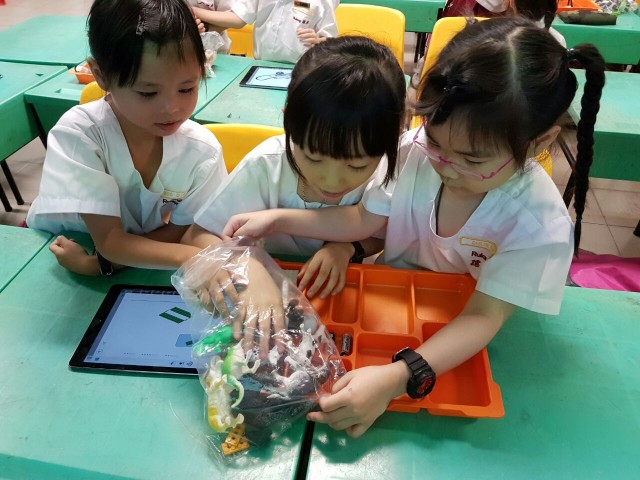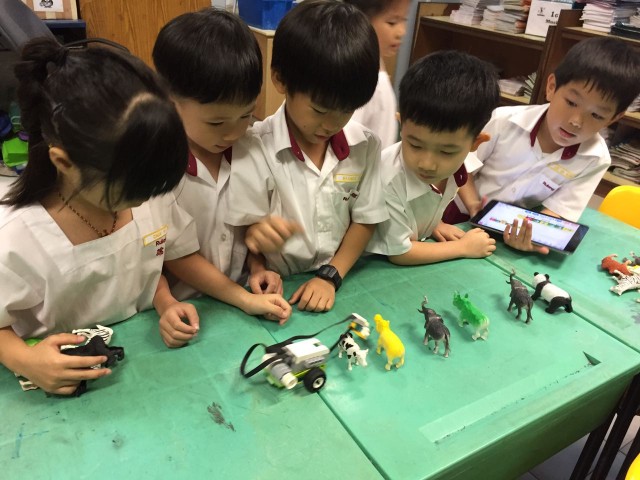Applied Learning Programme (ALP) @ Robotics
Applied Learning Programme (ALP) - Robotics
Rulang’s robotics programme is aligned to the school vision: ‘Scholars of Tomorrow” as it allows for holistic development of the pupils. It is also aligned with the Desired Outcomes of Education (DOE) as our pupils are able to develop a good sense of self-awareness, a sound moral compass, and the necessary skills and knowledge to take on challenges of the future. Lastly, it is in line with the spirit of ability-driven education and the drive towards ‘Teach Less, Learn More’ where pupils learn through experiential learning and the inquiry approach. The school has designed a teaching strategy, S.P.A.C.E (Scenario, Perceiving the Problem, Asking Questions, Cooperation, Evaluate) which would be used as a generic cooperative learning structure to conduct the Integrated Robotics Curriculum (IRC).
 The S.P.A.C.E Strategy was an innovation project which was born by our teachers. It was then submitted and eventually presented as part of the School-based Action Research in Robotics. From its humble beginning in 2008, it was further tested and trialled formally under the TLLM IGNITE 2 research scheme. The strategy S.P.A.C.E. is crafted based on the principles of painting a Scenario, Posing a problem, Asking questions, Collaborative learning and Evaluation. It is highly inquiry-based as it challenges pupils to connect their existing knowledge and apply them in a new situation. The concept of thinking beyond predictable situation proves engaging especially in the domain of metacognition. On a further note, with high emphasis in collaborative learning, character development such as team learning and leadership is inadvertently infused thus enhancing students’ camaraderie and confidence in working as a unit. This platform for problem solving has bring forth knowledge creation among the students. S.P.A.C.E strategy has been recognized by MOE Organisation Development Division (ODD) in 2012 as a breakthrough project.
The S.P.A.C.E Strategy was an innovation project which was born by our teachers. It was then submitted and eventually presented as part of the School-based Action Research in Robotics. From its humble beginning in 2008, it was further tested and trialled formally under the TLLM IGNITE 2 research scheme. The strategy S.P.A.C.E. is crafted based on the principles of painting a Scenario, Posing a problem, Asking questions, Collaborative learning and Evaluation. It is highly inquiry-based as it challenges pupils to connect their existing knowledge and apply them in a new situation. The concept of thinking beyond predictable situation proves engaging especially in the domain of metacognition. On a further note, with high emphasis in collaborative learning, character development such as team learning and leadership is inadvertently infused thus enhancing students’ camaraderie and confidence in working as a unit. This platform for problem solving has bring forth knowledge creation among the students. S.P.A.C.E strategy has been recognized by MOE Organisation Development Division (ODD) in 2012 as a breakthrough project.
 Based on the positive findings of the Action Research Team, S.P.A.C.E strategy was recommended and to be adopted as pedagogy for all IRC lesson plans as it brings about higher engagement in learning and cultivates teamwork through collaborative learning. This is an important element in IRC apart from the ability in using technology adeptly it also imbues scholarly traits such as teamwork, constructing one’s learning and taking responsibility for own learning. The mentioned traits would in the long run develop a questioning, reflecting and persevering mind while in the pursuit of acquiring knowledge. These are also the desired outcomes of the C2015 in nurturing a self-directed learner. This pervasive approach would in one way or another enable all pupils to experience the process of collaborative learning in S.P.A.C.E strategy thus benefitting the projected desired outcomes and be equipped with the 21st century skills and traits of an active contributor and self-directed learner..
Based on the positive findings of the Action Research Team, S.P.A.C.E strategy was recommended and to be adopted as pedagogy for all IRC lesson plans as it brings about higher engagement in learning and cultivates teamwork through collaborative learning. This is an important element in IRC apart from the ability in using technology adeptly it also imbues scholarly traits such as teamwork, constructing one’s learning and taking responsibility for own learning. The mentioned traits would in the long run develop a questioning, reflecting and persevering mind while in the pursuit of acquiring knowledge. These are also the desired outcomes of the C2015 in nurturing a self-directed learner. This pervasive approach would in one way or another enable all pupils to experience the process of collaborative learning in S.P.A.C.E strategy thus benefitting the projected desired outcomes and be equipped with the 21st century skills and traits of an active contributor and self-directed learner..
Since 2010, the programme has seen greater integration with core subjects to provide an increased acquisition of specific robotics skills and presentation skills to heighten the confidence level in our pupils. This is cognizant of the MOE’s Curriculum 2015 which aims to nurture and develop students to be confident person who think independently, communicate effectively and has good inter-personal skills. Moving forward, IRC has a set of forward-looking outcomes that strike a balance between enduring knowledge, values and the necessary 21st century skills and dispositions which will equip our students to thrive in a fast-changing, globalised world, while remaining uniquely Singaporean and a concerned citizen.
Learning Opportunities for All Pupils:
The Masses
- Every child will continue to have the opportunity to learn about and appreciate the use of robots through IRC.
- The school’s IRC complemented and enabled teachers to ‘teach less learn more’ as it provided experiential opportunities for pupils to learn through interaction with manipulative and technology. This allows better engagement of interests for subjects in both core and non-core.
- The learning experience in IRC will be S.P.A.C.E-driven to allow character development in pupils especially in the area of being an effective communicator, a good team player and an independent and active learner.
- Achieve an enduring understanding as well as appreciation on how robotics complements their learning thus seeing robotics as an integral component to their acquisition of knowledge.


The Talented
Different Robotics Systems will be infused into the technology lessons under Accelerated Education Programme (AEP) to expose pupils to more advanced programming, construction and building techniques. Eventually, these pupils in AEP will be identified and further nurtured to apply their skills and knowledge in their Project Work. The Project Work comprises of five main components which give pupils an opportunities to apply their knowledge and skills. The pupils are assessed based on the following:
- Technology Skill
- Oral Presentation Skill
- Research Skill
- Team work
- Self- Reflection
This approach would in one way or another enable the pupils to experience the process of collaborative learning in S.P.A.C.E strategy thus benefitting the projected desired outcomes and be equipped with the 21st century skills and traits of an active learner.

